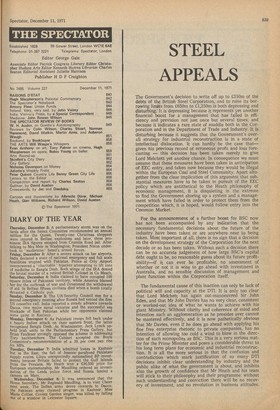STEEL APPEALS
The Government's decision to write off up to 050m of the debts of the British Steel Corporation, and to raise its borrowing limits from £650m to £1,250m is both depressing and disturbing: It is depressing because it represents yet another financial boost for a management that has failed in efficiency and prevision not just once but several times; and because it indicates a rare state of muddle both in the Corporation and in the Department of Trade and Industry. It is disturbing because it suggests that the Government's overall strategy for industrial reconstruction is in a state of intellectual dislocation. It can hardly be the case that— given his previous record of erroneous profit and loss forecasting — this decision has been taken merely to give Lord Melchett yet another chance. In consequence we must assume that these measures have been taken in anticipation of EEC entry, and taken now because they would be illegal within the European Coal and Steel Community. Apart altogether from the clear implication of this argument that substantial measures have to be taken in pursuit of the EEC policy which are antithetical to the Heath philosophy of economic management, it is disquieting in the extreme to find the Government shoring up a system and a management which have failed in order to protect them from the competition which, it is hoped, would follow entry into the Common Market.
For the announcement of a further boost for BSC now has not been accompanied by any indication that the necessary fundamental decisions about the future of the industry have been taken or are anywhere near to being taken. Most important of all, there is no sign that a decision on the development strategy of the Corporation for the next decade or so has been taken. Without such a decision there can be no accurate judgement of how large BSC's capital debt ought to be, no reasonable guess about its future profitability—if it can ever be profitable, no assessment of whether or not it is wise to go ahead with investment in Australia, and no sensible discussion of management and plant function within the Corporation itself.
The fundamental cause of this inaction can only be lack of political will and capacity at the DTI. It is only too clear that Lord Melchett has again out-manoeuvred Sir John Eden, and that Mr John Davies has no very clear, consistent or worked-out idea of what he wants to achieve with his giant Ministry. Without clarity and coherence of mind and intention such an agglomeration as he presides over cannot be mastered effectively, and it is now pathetically obvious that Mr Davies, even if he does go ahead with applying his fine free enterprise rhetoric to private companies, has no intention of allowing too cold a wind to blow in the direction of such monopolies as BSC. This is a very serious matter for the Prime Minister and poses a considerable threat to his long term plans for economic and industrial reconstruction. It is all the more serious in that the confusion and contradiction which mark justification of so many DTI decisions inhibit clear understanding by industry and the public alike of what the government is about, and inhibits also the growth of confidence that Mr Heath and his team will stick to their philosophy and their programme: without such understanding and conviction there will be no recovery of investment, and no revolution in business attitudes.










































 Previous page
Previous page